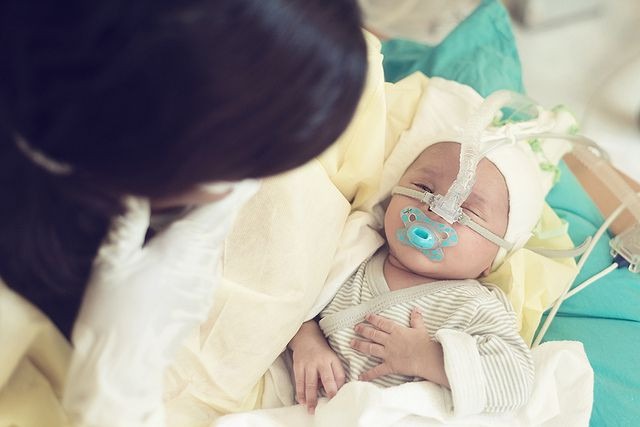Babies Repeatedly Exposed To Anesthesia May Suffer Anxiety, Behavior Problems Long Term: Study

Infants who are repeatedly exposed to anesthesia may suffer from long-term changes to their emotional behavior, a new animal study from Mount Sinai and the Yerkes National Primate Research Center suggested. Monkeys who were anesthetized at three points within the first five weeks of their lives showed greater anxiety than normal at six months, the researchers found.
"These results demonstrate that early anesthesia exposure, in the absence of a surgical procedure, comorbidities, or psychosocial stress associated with illness or the need for a surgical procedure, causes alterations in emotional behavior," concluded Dr. Mark Baxter, a professor at the Icahn School of Medicine, and his co-authors.
Each year nearly 250 million people “go under” during one or another medical procedure. Of these, approximately one million are children, under the age of 4, who require anesthesia for surgery, according to the Food and Drug Administration. While, generally, anesthesia is considered to be very safe, recent studies have proposed that children may develop anxiety, depression, and learning disabilities when given these drugs multiple times at age 4 or younger. (Notably, research on human cells (and not human beings) has suggested anesthetics may increase the buildup of the protein that causes Alzheimer’s disease.)
What’s the truth? In children, anesthesia usually accompanies surgery or some other medical procedures, so it is hard to separate out which factor potentially might cause a later psychological or cognitive problem.
Drug, Stress Response, Or Other Factor?
As Dr. Roderic G. Eckenhoff, a professor in the Department of Anesthesiology and Critical Care at the University of Pennsylvania, explained to Medical Daily, anesthesia is a very unusual physical state and “any number of things associated with the state the drug produces” might be responsible for later effects. Past studies, he said, have proven that within hours after use anesthesia results in excess brain cell death and this is species-dependent. Yet, associating cell death with some later effect, such as behavioral changes or cognitive dysfunction, is difficult to prove. Then, experimenting on a monkey means you will have to maintain them for four hours of anesthesia. This requires IV access, ventilation (via a tube inserted into the trachea).
“If you were awake you would be very uncomfortable,” he said. “Those things alone can cause a significant stress response… so is it the stress response in the brain during a period of development that causes effects later on?”
Understanding these difficulties, the researchers behind the current study nevertheless investigated whether anesthesia, in and of itself, might cause long-term behavioral changes.
To accomplish this, the research team exposed 10 rhesus monkeys to sevoflurane, the most commonly used general anesthetic in pediatric patients, for four hours — about the time it would take for a human to undergo a significant surgical procedure. This exposure occurred at postnatal day seven and then again two and four weeks later. (In terms of brain growth, a 6-week-old rhesus monkey roughly corresponds to a human in the second half of the first year of life.) To separate anesthesia exposure from other potential causes of health problems, the current experiment was performed minus any surgeries or disease, which would be part of a human baby’s experience.
What happened next? At six months, the experimental monkeys along with healthy monkeys were given a mild social stress test and compared. The stress test was very simple: An unfamiliar human entered the environment. Observing carefully, the researchers discovered the anesthesia-exposed infant monkeys expressed more anxiety through their behavior than the controls.
The researchers will continue to follow the experimental monkeys in order to determine the exact length of time the changes persist or whether these changes resolve over time.
"It’s important research, it's important data," said Eckenhoff, adding, "But taking it to a clinical recommendation, taking it to parents, we aren’t there yet." After all, as he explained, using anesthesia on babies "is a very controversial and heated topic" with lots of concern on the side of both doctors and parents.
Source: Raper J, Alvarado MC, Murphy KL, et al. Multiple Anesthetic Exposure in Infant Monkeys Alters Emotional Reactivity to an Acute Stressor. Anesthesiology. 2015.



























